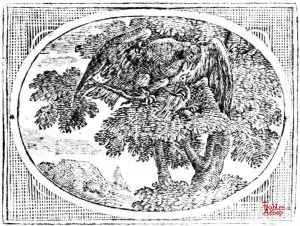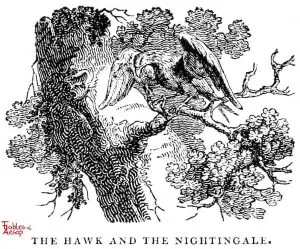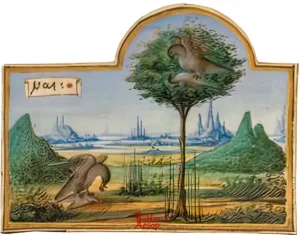A nightingale gets caught by a hawk and pleas for life because he is such a small bit of a meal. Too bad. Yum, yum.
A bird caught is better than more uncaught.

Townsend version
A nightingale, sitting aloft upon an oak and singing according to his wont, was seen by a Hawk who, being in need of food, swooped down and seized him. The Nightingale, about to lose his life, earnestly begged the Hawk to let him go, saying that he was not big enough to satisfy the hunger of a Hawk who, if he wanted food, ought to pursue the larger birds. The Hawk, interrupting him, said: “I should indeed have lost my senses if I should let go food ready in my hand, for the sake of pursuing birds which are not yet even within sight.”

Samuel Croxall
A NIGHTINGALE, sitting all alone among the shady branches of an oak, sung with so melodious and shrill a pipe, that she made the woods echo again, and alarmed a hungry Hawk, who was at some distance off, watching for his prey; he had no sooner discovered the little musician, but, making a stoop at the place, he seized her with his crooked talons, and bid her prepare for death. Ah! says she, for mercy’s sake, don’t do so barbarous a thing, and so unbecoming yourself; consider, I never did you any wrong, and am but a poor small morsel for such a stomach as yours; rather attack some larger fowl, which may bring you more credit, aud a better meal, and let me go. Ay! says the Hawk, persuade me to it if you can; I have been upon the watch all the day long, and have not met with one hit of any thing, till I caught you; and now you would have me let you go, in hopes of something better, would you? Pray, who would be the fool then?
THE APPLICATION
They who neglect the opportunity of reaping a small advantage in hopes they shall obtain a better, are far from acting upon a reasonable and well-advised foundation. The figure of time is always drawn with a single lock of hair hanging over his forehead, and the back part of his head bald; to put us in mind, that we should be sure to lay bold of an occasion when it presents itself to us; lest afterwards we repent us of our omission and folly, and would recover it when it is too late. It is a very weak reason to give for our refusal of an offer of kindness, that we do it because we desire or deserve a better: for it is time enough to relinquish the small affair, when the great one comes, if ever it does come. But, supposing it should not, how can we forgive ourselves for letting any thing slip through our hand, by vainly gaping after something else, which we never could obtain? He who has not been guilty of any of these kind of errors, however poorly he may come off at last, has only the malice of fortune, or of somebody else, to charge with his ill success; and may applaud himself with some comfort, in never having lost an opportunity, though ever so small, of bettering and improving his circumstances. Unthinking people have oftentimes the unhappiness to fret and teaze themselves with retrospects of this kind; which they, who attend to the business of life as they ought, never have occasion to make.

JBR Collection
A Nightingale once fell into the clutches of a hungry Hawk who had been all day on the look-out for food. “Pray let me go,” said the Nightingale, “I am such a mite for a stomach like yours. I sing so nicely too. Do let me go, it will do you good to hear me.” “Much good it will do to an empty belly,” replied the Hawk, “and besides, a little bird that I have is more to me than a great one that has yet to be caught.”

Gherardo Image from 1480

Luscinia et Accipiter
Luscinia, ab accipitre famelico comprehensa, cum se ab eo devorandam intellegeret, blande eum rogabat ut se dimitteret, pollicita pro tanto beneficio ingentem mercedem sese relaturam. Cum autem accipiter eam interrogaret quid gratiae sibi referre posset, “Aures,” inquit, “tuas mellifluis cantibus demulcebo.” “At ego,” inquit accipiter, “malo mihi ventrem demulceas. Sine tuis enim cantibus vivere; sine cibo non possum.”
Perry #004



